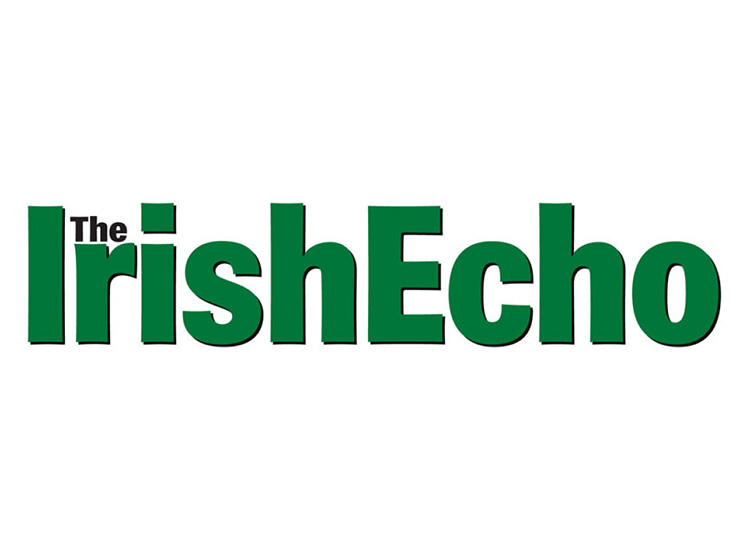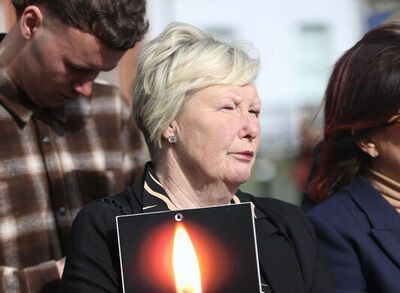Open the Door for Three.
By Daniel Neely
Open the Door for Three sure knows how to make great albums. Their first two, “Open the Door for Three” and “The Penny Wager” were both fabulous, well-balanced recordings that featured high-level playing and tasteful musical choices. Their newest effort, “The Joyful Hour,” is a similarly fabulous album and it may even exceed the standard set by the other two. It’s not that the group’s playing has changed. They’re still the lovable trio of top players they’ve always been. Nor have they become markedly bolder in how they approach their arrangements – their “sound” hasn’t changed any. But something rare is clicking on this release that makes the whole thing seem special. Regardless of what that thing might be, the results are brilliant.
Open the Door for Three is Pat Broaders (bouzouki/vocals), Liz Knowles (fiddle/hardanger d’amore), and Kieran O’Hare (uilleann pipes, flute, tin whistles). Top musicians all, each has serious and well established musical pedigrees individually and a strong track record together. (BTW, anyone remember “Ireland: Crossroads Of Art And Design, 1690-1840,” THE sleeper album of 2015? O’Hare and Knowles were a major reason…just saying.)
The album opens with the fabulous “Boyne Water,” a trio of tunes that starts simply with a reel on tin whistle and then escalates into a much fuller, layered arrangement as the rhythms changes over to a jig. The track’s drive sets an auspicious tone because although it shows the hard edge in the band’s playing, it also reveals the nuance and dynamic sensitivity in the group’s approach. It’s what’s explored in the rest of the album.
https://youtu.be/3dMD4x_TVHU
By the time we reach “Church Hill,” the album’s third track, things are simmering. It features two jigs, the titular “Church Hill” comes from the now-popular Goodman Collection, and the second is the well loved classic “Monaghan Jig.” The tunes are very nice selections, but again, what stands out is the drive. These tunes hop along at a nice, brisk pace, and the way the group’s players locked in withe each other, coupled with the fabulous arrangement makes this impressive track stand apart.
The group also stands out on “The Joyful Hour,” a track that just flows along and features a lovely countermelody in the final tune, and “The Boy in the Tree,” which features some fierce piping from O’Hare. Contrast these with the almost pastoral quality of “An Bhean Dubh,” a slow tune on which Knowles’s fiddle playing absolutely shines, and the album’s sense of “bigger picture” begins to develop.
https://youtu.be/uakMoGEUHSA
Broaders takes the vocal lead on several tracks. His clear, piercing voice is in fine form throughout and I love the songs he’s singing here – as one might suspect, they’re supported by excellent arrangements. “Carrig Water” is one of the standouts. Broader does the song great justice, and his work is complemented by some terrific interplay between the pipes and the fiddle.
Another lovely song is “Creeping Jane.” There, Broader’s voice floats over the song’s galloping rhythm and is complemented by instrumental interludes, including a nice bit of drone towards song’s end that leads into a fine take on the reel “The Morning Star.” It’s a lovely one.
Ultimately, “The Joyful Hour” is a thrilling collection and arguably the finest of the group’s three albums. A brilliant mix of neatly chosen songs and tunes, the music is brought to life by great arrangements and brilliant musicianship. Its variety in tempo and intensity makes it an engaging collection to listen to as a whole, but each track has plenty to enjoy individually as well. It’s hard to imagine lovers of traditional music not enjoying this album – a must have, really. For more (including blog entries that expand on the album’s liner notes), visit the band’s website www.openthedoorforthree.com.










